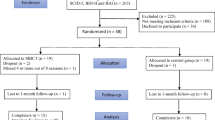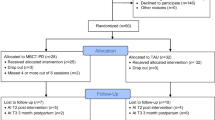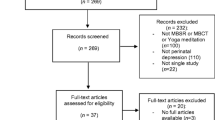Abstract
Anxiety is common during pregnancy and associated with poorer outcomes for mother and child. Our single-arm pilot study of an 8-week mindfulness-based cognitive therapy (MBCT) intervention for pregnant women with elevated anxiety showed significant pre- to post-intervention improvements in anxiety, depression, worry, mindfulness, and self-compassion. It remains unclear whether these improvements are maintained postpartum and whether amount of formal mindfulness practice is correlated with outcomes. The current study examined whether (1) improvements in psychosocial outcomes were maintained 3 months postpartum; (2) women were adherent to formal practice recommendations; and (3) amount of mindfulness practice was correlated with outcomes. Twenty-three pregnant women (M age = 33.5, SD = 4.40; 75% White; 71% with generalized anxiety disorder) completed home practice logs throughout the intervention, and self-report measures before and after the intervention and 3 months postpartum. Results indicated that previously reported post-intervention improvements in anxiety, worry, mindfulness, and self-compassion were maintained postpartum (p’s < .05), and reductions in depression further improved (p < .001). Participants were generally adherent to mindfulness practice recommendations during the intervention (54–80% weekly adherence; M = 17.31 total practice hours [SD = 7.45]), and many continued practicing 1 week post-intervention (91%) and postpartum (55%). Mindfulness practice during the intervention was not significantly correlated with any outcome at post-intervention or postpartum. Mindfulness practice postpartum was only marginally related to improved worry postpartum (p = .05). MBCT may be associated with maintained improvements in psychosocial outcomes for women during pregnancy and postpartum, but the role of mindfulness practice is unclear. Research using larger samples and randomized controlled designs is needed.
Similar content being viewed by others
References
Alder, J., Fink, N., Bitzer, J., Hösli, I., & Holzgreve, W. (2007). Depression and anxiety during pregnancy: a risk factor for obstetric, fetal and neonatal outcome? A critical review of the literature. The Journal of Maternal-Fetal & Neonatal Medicine, 20, 189–209.
Arch, J. J. (2014). Cognitive behavioral therapy and pharmacotherapy for anxiety: treatment preferences and credibility among pregnant and non-pregnant women. Behaviour Research and Therapy, 52, 53–60.
Battle, C. L., Salisbury, A. L., Schofield, C. A., & Ortiz-Hernandez, S. (2013). Perinatal antidepressant use: understanding women’s preferences and concerns. Journal of Psychiatric Practice, 19, 443–453.
Beck, A. T., & Steer, R. A. (1990). Manual for the Beck anxiety inventory. San Antonio: Psychological Corporation.
Beck, A. T., Epstein, N., Brown, G., & Steer, R. A. (1988a). An inventory for measuring clinical anxiety: psychometric properties. Journal of Consulting and Clinical Psychology., 56, 893–897.
Beck, A. T., Steer, R. A., & Garbin, G. M. (1988b). Psychometric properties of the Beck Depression Inventory: twenty-five years of evaluation. Clinical Psychology Review, 8, 77–100.
Beck, A. T., Steer, R. A., & Brown, G. K. (1996). Beck depression inventory-II. San Antonio: Psychological Corporation.
Bishop, S. R., Lau, M., Shapiro, S., Carlson, L., Anderson, N. D., Carmody, J., ... & Devins, G. (2004). Mindfulness: a proposed operational definition. Clinical Psychology: Science and Practice, 11, 230–241.
Brown, K. W., & Ryan, R. M. (2003). The benefits of being present: mindfulness and its role in psychological well-being. Journal of Personality and Social Psychology, 84, 822–848.
Byrne, J., Hauck, Y., Fisher, C., Bayes, S., & Schutze, R. (2014). Effectiveness of a mindfulness-based childbirth education pilot study on maternal self-efficacy and fear of childbirth. Journal of Midwifery & Women’s Health, 59, 192–197.
Carmody, J., & Baer, R. A. (2008). Relationships between mindfulness practice and levels of mindfulness, medical and psychological symptoms and well-being in a mindfulness-based stress reduction program. Journal of Behavioral Medicine, 31, 23–33.
Crane, C., Crane, R. S., Eames, C., Fennell, M. J., Silverton, S., Williams, J. M. G., & Barnhofer, T. (2014). The effects of amount of home meditation practice in mindfulness based cognitive therapy on hazard of relapse to depression in the Staying Well after Depression Trial. Behaviour Research and Therapy, 63, 17–24.
Dimidjian, S., Goodman, S. H., Felder, J. N., Gallop, R., Brown, A. P., & Beck, A. (2015). An open trial of mindfulness-based cognitive therapy for the prevention of perinatal depressive relapse/recurrence. Archives of Women’s Mental Health, 18, 85–94.
Dimidjian, S., Goodman, S. H., Felder, J. N., Gallop, R., Brown, A. P., & Beck, A. (2016). Staying well during pregnancy and the postpartum: a pilot randomized trial of mindfulness-based cognitive therapy for the prevention of depressive relapse/recurrence. Journal of Consulting and Clinical Psychology, 84, 134–145.
Elwafi, H. M., Witkiewitz, K., Mallik, S., Thornhill IV, T. A., & Brewer, J. A. (2013). Mindfulness training for smoking cessation: moderation of the relationship between craving and cigarette use. Drug and Alcohol Dependence, 130, 222–229.
Fairborther, N., Janssen, P., Antony, M. M., Tucker, E., & Young, A. H. (2016). Perinatal anxiety disorder prevalence and incidence. Journal of Affective Disorders, 200, 148–155.
Faisal-Cury, A., & Menezes, P. R. (2007). Prevalence of anxiety and depression during pregnancy in a private setting sample. Archive of Women’s Mental Health, 10, 25–32.
Fisher, C., Hauck, Y., Bayes, S., & Byrne, J. (2012). Participant experiences of mindfulness-based childbirth education: a qualitative study. BioMed Central Pregnancy and Childbirth, 12, 126.
Fjorback, L. O., Arendt, M., Ørnbøl, E., Fink, P., & Walach, H. (2011). Mindfulness-based stress reduction and mindfulness-based cognitive therapy—a systematic review of randomized controlled trials. Acta Psychiatrica Scandinavica, 124, 102–119.
Fresco, D. M., Mennin, D. S., Heimberg, R. G., & Turk, C. L. (2003). Using the Penn State Worry Questionnaire to identify individuals with generalized anxiety disorder: a receiver operating characteristic analysis. Journal of Behavior Therapy and Experimental Psychiatry, 34(3), 283–291.
Gambrel, L., & Piercy, F. (2015). Mindfulness-based relationship education for couples expecting their first child—part 2: phenomenological findings. Journal of Marital and Family Therapy, 41, 25–41.
Glasheen, C., Richardson, G. A., & Fabio, A. (2010). A systematic review of the effects of postnatal maternal anxiety on children. Archives of Women’s Mental Health, 13, 61–74.
Glover, V., & O’Connor, T. (2006). Maternal anxiety: its effect on the fetus and the child. British Journal of Midwifery, 14, 663–667.
Goodman, J. H. (2009). Women’s attitudes, preferences, and perceived barriers to treatment for perinatal depression. Birth, 36, 60–69.
Goodman, J. H., & Tyer-Viola, L. (2010). Detection, treatment, and referral of perinatal depression and anxiety by obstetrical providers. Journal of Women’s Health, 19, 477–490.
Goodman, J. H., Guarino, A., Chenausky, K., Klein, L., Prager, J., Petersen, R., ... & Freeman, M. (2014a). CALM Pregnancy: results of a pilot study of mindfulness-based cognitive therapy for perinatal anxiety. Archives of Women’s Mental Health, 17, 373–387.
Goodman, J. H., Chenausky, K. L., & Freeman, M. P. (2014b). Anxiety disorders during pregnancy: a systematic review. Journal of Clinical Psychiatry, 75, e1153–e1184.
Goodman, J. H., Watson, G. R., & Stubbs, B. (2016). Anxiety disorders in postpartum women: a systematic review and meta-analysis. Journal of Affective Disorders, 203, 292–331.
Guardino, C. M., Schetter, D. C., Bower, J. E., Lu, M. C., & Smalley, S. L. (2014). Randomised controlled pilot trial of mindfulness training for stress reduction during pregnancy. Psychology & Health, 29, 334–349.
Heron, J., O’Connor, T. G., Evans, J., Golding, J., Glover, V., & ALSPAC Study Team. (2004). The course of anxiety and depression through pregnancy and the postpartum in a community sample. Journal of Affective Disorders, 80, 65–73.
Jain, S., Shapiro, S. L., Swanick, S., Roesch, S. C., Mills, P. J., Bell, I., & Schwartz, G. E. (2007). A randomized controlled trial of mindfulness meditation versus relaxation training: effects on distress, positive states of mind, rumination, and distraction. Annals of Behavioral Medicine, 33, 11–21.
Ji, S., Long, Q., Newport, D. J., Na, H., Knight, B., Zach, E. B., ... & Stowe, Z. N. (2011). Validity of depression rating scales during pregnancy and the postpartum period: impact of trimester and parity. Journal of Psychiatric Research, 45, 213–219.
Kabat-Zinn, J., Lipworth, L., Burncy, R., & Sellers, W. (1987). Four-year follow-up of a meditation-based program for the self-regulation of chronic pain: treatment outcomes and compliance. The Clinical Journal of Pain, 2, 159–774.
Killingsworth, M. A., & Gilbert, D. T. (2010). A wandering mind is an unhappy mind. Science, 330, 932–932.
Lee, A. M., Lam, S. K., Sze, M. L. S. M., Chong, C. S., Chui, H. W., & Fong, D. Y. (2007). Prevalence, course, and risk factors for antenatal anxiety. Obstetrics & Gynecology, 110, 1102–1112.
Leyfer, O. T., Ruberg, J. L., & Woodruff-Borden, J. (2006). Examination of the utility of the Beck Anxiety Inventory and its factors as a screener for anxiety disorders. Journal of Anxiety Disorders, 20, 444–458.
MacKillop, J., & Anderson, E. J. (2007). Further psychometric validation of the mindful attention awareness scale. Journal of Psychopathology and Behavioral Assessment, 29, 289–293.
Meyer, T. J., Miller, M. L., Metzger, R. L., & Borkovec, T. D. (1990). Development and validation of the penn state worry questionnaire. Behaviour Research and Therapy, 28(6), 487–495.
Neff, K. D. (2003). The development and validation of a scale to measure self-compassion. Self and Identity, 2, 223–250.
O’Connor, T. G., Heron, J., Golding, J., Beveridge, M., & Glover, V. (2002). Maternal antenatal anxiety and children’s behavioural/emotional problems at 4 years. The British Journal of Psychiatry, 180, 502–508.
Perez-Blasco, J., Viguer, P., & Rodrigo, M. F. (2013). Effects of a mindfulness-based intervention on psychological distress, well-being, and maternal self-efficacy in breast-feeding mothers: results of a pilot study. Archives of Women’s Mental Health, 16, 227–236.
Perich, T., Manicavasagar, V., Mitchell, P. B., & Ball, J. R. (2013). The association between meditation practice and treatment outcome in mindfulness-based cognitive therapy for bipolar disorder. Behaviour Research and Therapy, 51, 338–343.
Raes, F., Pommier, E., Neff, K. D., & Van Gucht, D. (2011). Construction and factorial validation of a short form of the self-compassion scale. Clinical Psychology & Psychotherapy, 18, 250–255.
Rosenzweig, S., Greeson, J. M., Reibel, D. K., Green, J. S., Jasser, S. A., & Beasley, D. (2010). Mindfulness-based stress reduction for chronic pain conditions: variation in treatment outcomes and role of home meditation practice. Journal of Psychosomatic Research, 68, 29–36.
Sears, R. W., Tirch, D. D., & Denton, R. B. (2011). Mindfulness in clinical practice. New York: Professional Resource Exchange.
Segal, Z., Williams, J., & Teasdale, J. (2012). Mindfulness-based cognitive therapy for depression (2nd ed.). New York: Guilford Press.
Sephton, S. E., Salmon, P., Weissbecker, I., Ulmer, C., Floyd, A., Hoover, K., & Studts, J. L. (2007). Mindfulness meditation alleviates depressive symptoms in women with fibromyalgia: results of a randomized clinical trial. Arthritis Care & Research, 57, 77–85.
Shapiro, S. L., Bootzin, R. R., Figueredo, A. J., Lopez, A. M., & Schwartz, G. E. (2003). The efficacy of mindfulness-based stress reduction in the treatment of sleep disturbance in women with breast cancer: an exploratory study. Journal of Psychosomatic Research, 54, 85–91.
Stein, A., Pearson, R. M., Goodman, S. H., Rapa, E., Rahman, A., McCallum, M., ... & Pariante, C. M. (2014). Effects of perinatal mental disorders on the fetus and child. The Lancet, 384, 1800–1819.
Talge, N. M., Neal, C., & Glover, V. (2007). Antenatal maternal stress and long-term effects on child neurodevelopment: how and why? Journal of Child Psychology and Psychiatry, 48, 245–261.
Tamagawa, R., Speca, M., Stephen, J., Pickering, B., Lawlor-Savage, L., & Carlson, L. E. (2015). Predictors and effects of class attendance and home practice of yoga and meditation among breast cancer survivors in a mindfulness-based cancer recovery program. Mindfulness, 6, 1201–1210.
Taylor, B. L., Cavanagh, K., & Strauss, C. (2016). The effectiveness of mindfulness-based interventions in the perinatal period: a systematic review and meta-analysis. PLoS One, 11, e0155720.
Van den Bergh, B. R., Van Calster, B., Smits, T., Van Huffel, S., & Lagae, L. (2008). Antenatal maternal anxiety is related to HPA-axis dysregulation and self-reported depressive symptoms in adolescence: a prospective study on the fetal origins of depressed mood. Neuropsychopharmacology, 33, 536–545.
Vettese, L. C., Toneatto, T., Stea, J. N., Nguyen, L., & Wang, J. J. (2009). Do mindfulness meditation participants do their homework? And does it make a difference? A review of the empirical evidence. Journal of Cognitive Psychotherapy, 23, 198–225.
Vieten, C., & Astin, J. (2008). Effects of a mindfulness-based intervention during pregnancy on prenatal stress and mood: results of a pilot study. Archives of Women’s Mental Health, 11, 67–74.
Wahbeh, H., Zwickey, H., & Oken, B. (2011). One method for objective adherence measurement in mind–body medicine. Journal of Alternative and Complementary Medicine, 17, 175–177.
Woolhouse, H., Mercuri, K., Judd, F., & Brown, S. J. (2014). Antenatal mindfulness intervention to reduce depression, anxiety and stress: a pilot randomized controlled trial of the Mind-Baby Body program in an Australian tertiary maternity hospital. BioMed Central Pregnancy and Childbirth, 14, 369.
Funding
This study was supported by funding from the National Center for Complementary and Integrative Health (NCCIH 2T32AT000051-6; Luberto) and National Cancer Institute (NCI 1K24CA197382; Park) and the Eunice Kennedy Shriver National Institute of Child Health and Human Development (1R21HD065156-01; Goodman).
Author information
Authors and Affiliations
Contributions
CML completed the data analyses and wrote the paper; ERP assisted with the data analyses and edited the paper; JHG designed and executed the study, contributed to writing and editing the paper.
Corresponding author
Ethics declarations
Conflict of Interest
The authors declare that they have no conflict of interest.
Ethical Approval
All procedures performed in studies involving human participants were in accordance with the ethical standards of the institutional and/or national research committee and with the 1964 Helsinki Declaration and its later amendments or comparable ethical standards. The Partners IRB at Massachusetts General Hospital provided IRB approval for this study.
Informed Consent
All participants completed IRB-approved informed consent procedures before participating in the study.
Rights and permissions
About this article
Cite this article
Luberto, C.M., Park, E.R. & Goodman, J.H. Postpartum Outcomes and Formal Mindfulness Practice in Mindfulness-Based Cognitive Therapy for Perinatal Women. Mindfulness 9, 850–859 (2018). https://doi.org/10.1007/s12671-017-0825-8
Published:
Issue Date:
DOI: https://doi.org/10.1007/s12671-017-0825-8




